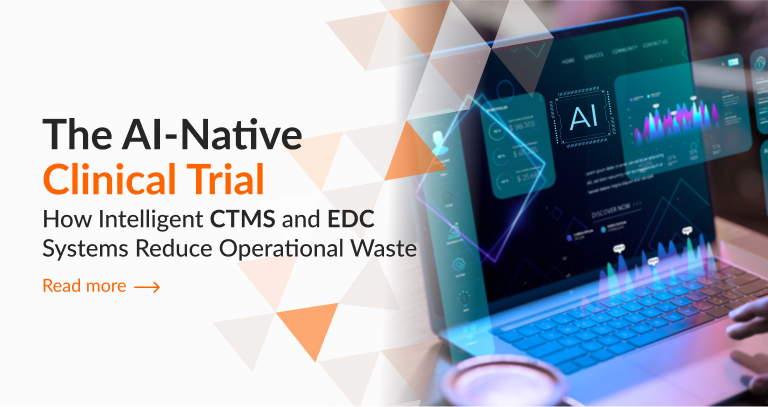AI spending in the pharmaceutical sector is expected to increase. Advanced AI technologies provide chances to improve efficiency, quality, and speed at all stages of clinical research.
AI halves the time to market for life-saving medication. That’s a big statement. But wait. AI’s capabilities back it up.
Artificial intelligence (AI) is expected to be the most disruptive new technology in drug development in 2024, allowing improved analytics, automating processes, and enhancing speed throughout the clinical trial value chain.
The COVID-19 epidemic, geopolitical uncertainties, and climatic challenges all have an impact on today's clinical trial scene. Meanwhile, advances in adaptive design, customization, and innovative therapies make clinical trials more difficult than ever. In an ever-changing global market, sponsors desire more agility and a shorter time to commercialization while preserving quality and safety. AI provides chances for optimization across the clinical research process.
- Clinical trial patient recruitment and management:
Patient recruiting, site setup, querying, data evaluation, and data cleansing are all major bottlenecks.
Patient recruiting is usually the most time-consuming part of a research experiment. Sponsors must locate and identify a group of subjects, collect data, and apply inclusion/exclusion criteria to filter and select participants. High-quality patient recruitment is critical to a trial's success.
Once recruited, patients must be appropriately managed. Patient retention has a direct influence on the quality of the trial's outcomes, hence managing them is critical. In today's clinical trials, these patients might be spread over more than 100 locations and various continents, posing significant data management issues for sponsors.
AI may be applied to patient recruitment and management to improve efficiency, quality, and retention. Algorithms can collect subject information while screening and filtering potential participants. They can use data sources like medical records and social media information to identify subgroups and regions that may be relevant to the experiment. AI can also inform medical personnel and patients about clinical trial prospects.
What was the result? Patient recruitment will be faster and more efficient, allowing us to reach more varied communities and relevant participants while also increasing quality and retention. Using AI, you may create the appropriate cohort. It is about precision, efficiency, and safety.
- Shortening study build timelines for clinical trials:
The process of creating a study can be time-consuming and repetitious. Typically, data managers must read the research protocol and create 50-60 case report forms (CRF). Each study has unique CRF needs. CRF design and database development can take several weeks and have a direct influence on clinical trial quality and accuracy.
Automated text reading can parse, categorize, and stratify word corpora to create eCRFs and a data capture matrix. In research design, AI can read protocols and select the optimum CRF forms for the best results.
It may then use the data points from the CRFs to construct the research base, building the whole database in minutes rather than weeks. The database is set up for export to the biostatistician's programming. AI may then help with data analysis and the creation of the necessary tables, lists, and figures (TLFs). It can even reach a conclusion on the outcomes, subject to revision.
Optical character recognition (OCR) can process both organized and unstructured native documents. Using built-in edit checks, AI may shorten study development time from ten weeks to one, freeing up data managers' time. We are able to do up to 168% more edit checks than are done currently in the human manual process.. AI may also automate remote monitoring to spot outliers and recommend the best course of action, which will be implemented with project manager's permission.
AI data management is adaptable, agile, and resilient. Using electronic data capture (EDC) eliminates the need to handle paper-based documents. This is critical for current clinical trials, which can contain massive volumes of unstructured data due to advancements such as decentralization, wearables, telemedicine, and self-reporting.
Once the trial is initiated, you may utilize AI to do automated querying and medical coding. When a piece of data does not make sense or is not coded, AI may detect it and provide suggestions automatically. The data manager just evaluates what has been corrected. That's a huge time-saving. By incorporating AI into data intake, sponsors avoid the time-consuming process of data cleansing at the end of a study.
In Conclusion
Implementing AI entails developing a proof of concept, creating a customized knowledge base, and training the model to handle the issue on a broad scale. Algorithms must be trained on enormous volumes of data to eliminate bias and assure accuracy. Today, APIs allow best-in-class advancements to be integrated into clinical trial applications.
By removing repetitive duties from human staff, AI shortens the time to market for life-saving pharmaceuticals while freeing up man-hours for more specialized jobs. AI may be used to inform future research by analyzing previous and current trial data, with machine learning capable of recommending improved study design. In the long run, AI has the ability to move the focus away from trial execution and toward drug development, resulting in better therapies for patients who require them.
Related Topics:
Power of Artificial Intelligence (AI) and Machine Learning (ML) in Clinical Trials: A Paradigm Shift
Revolutionizing Clinical Trials: The Role of Artificial Intelligence and Machine Learning




